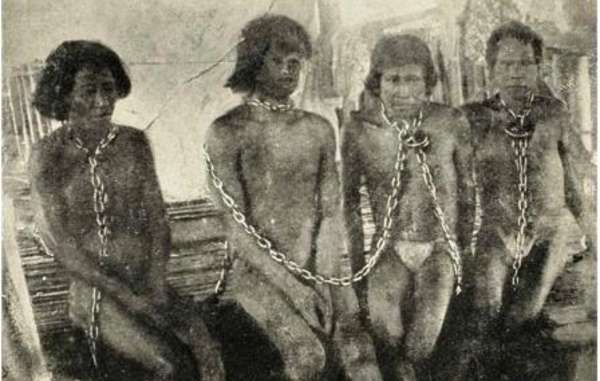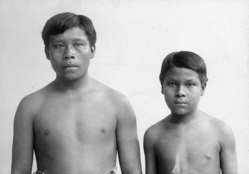100 years on–the unsolved mystery of the rubber boom slaves
Exactly 100 years after the Daily News first introduced her ancestors Omarino and Ricudo to the British public, Fany Kuiru, a Witoto Indian from Colombia, has appealed to the outside world to ‘help us uncover the fate of our indigenous brothers … so that our ancestors’ spirits can rest in peace.’
The Indians were ‘presented’ to British Consul Roger Casement in their Putumayo homeland in southern Colombia in 1910. Omarino was exchanged for a pair of trousers and a shirt; Ricudo was won in a game of cards.
Casement, who had been sent by the British government to investigate atrocities in the Amazon during the rubber boom, brought the pair to the UK to publicize the horrors he uncovered.
Sky-rocketing demand for Amazonian rubber was kick-started when US company Goodyear discovered vulcanization–a process that makes rubber hard enough to use for car tires. The breakthrough gave rise to the first mass production of cars by industry leader, Ford.

‘We are sent far, far into the forest to get rubber, and if we do not get it, or if we do not get it quickly enough, we are shot,’ Omarino told the Daily News.
Many of today’s uncontacted Indians are descended from the survivors of the rubber boom atrocities, who fled into remote headwaters to escape the killings, torture and epidemics that decimated the indigenous population.
After receiving the photographs of her ancestors, Fany told Survival, ‘Every nation did its bit to exterminate indigenous people: Colombia neglected them; Peru was mastermind and accomplice to the holocaust; England financed it, and Brazil uprooted Indians to work on the rubber plantations.’
It is not known what became of the two slaves, whose parting words to the Daily News were, ‘London is very wonderful, but the great river and the forest, where the birds fly, is more beautiful. One day we shall go back.’ It is not known whether either returned home.
Survival International Director Stephen Corry said today, ‘The rubber boom may seem like remote history, but its effect is still with us. When the West began its marriage to the motor car, its love letters were written in Indian blood. It provoked a gross crime against humanity which was perpetrated by a British company in the Witoto area. The parallel should not be exaggerated, but today there are still British companies, such as Vedanta Resources, planning the theft of tribal land, this time in India. It’s time to put a stop to these crimes and start treating tribal people like human beings.’
Below: "Omarino and Ricudo, two Witoto slaves brought to the UK in 1911."


Well, since the UK outlawed slavery decades before the US (and the fact that Britons were favoring abolition in the late 18th century contributed to America's calls for independence), I guess we could add a new one to the "screw the rules" meme list: "Screw the rules, you're Indiasn." No shocker there.
ReplyDeleteSlavery of Natives in general gets very little press at all.
ReplyDeleteOne dirty secret being that even after the Civil War the Mexicans were still dragging off Navajo women and children to Mexico while the American Government did nothing, even though they knew it was happening.